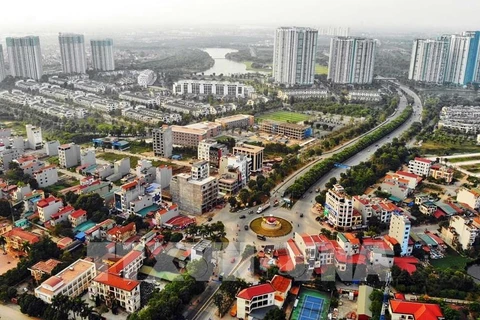 The World Bank held a press conference launching its latest economic update entitled “Making Public Investment Work for Growth” on August 10. (Photo: VietnamPlus)
The World Bank held a press conference launching its latest economic update entitled “Making Public Investment Work for Growth” on August 10. (Photo: VietnamPlus) Hanoi (VNA) – Vietnam’s economic growth slowed from 8% in 2022 to 3.7% in the first half of 2023 due to a challenging external environment and weaker domestic demand.
However, the economy will pick up pace over the second half of this year, and the following years, according to the World Bank (WB)’s latest economic update entitled “Making Public Investment Work for Growth” released on August 10.
According to the report, Vietnam's GDP growth in the first half of the year was only 3.7% (compared to the same period last year) and much lower than the 6.4% growth in the first six months of 2022.
Dorsati Madani, the WB’s senior country economist, said that the slowdown was caused by a slump in external demand as export turnover reduced by 12% compared to the same period last year. Meanwhile, domestic demand was weaker after last year’s strong post-COVID rebound.
Moreover, consumer confidence is weakening as the consumption growth rate dropped to 2.7% compared to the same period last year.
Noting that the decrease in aggregate demand was reflected in the manufacturing sector - total supply, Dorsati cited the industrial sector's contribution to growth down 0.4 percentage points in the first half of the year. Besides the shock relating to falling export demand, power shortages hit northern provinces in May and June disrupting economic activities with estimated losses accounting for 0.3% of GDP.
In addition, the WB’s Private Economic Development Research Board took a survey of 10,000 businesses in the first four months of the year. They found that 60% of the businesses said that their revenue decreased by at least 20%. Some 59% of businesses suffered from a reduced number of orders, and 71% had to cut at least 5% of employees.
The Southeast region - one of the key export areas saw a skyrocketing number of people getting unemployment benefits in the second quarter - nearly 62%.
Although demand has slowed down, it is still the main driver of growth in 2023. It is expected that private consumption will stand firm with an increase of 6% over the same period in 2022 and contribute 3.4. percentage points for GDP growth, Dorsati said.
The WB forecasts that Vietnam's economic growth will reach 4.7% in 2023 and gradually accelerate to 5.5% in 2024 and 6% by 2025.
The consumer price index (CPI) is expected to increase slightly from an average of 3.1% in 2022 to 3.5% in 2023. The increase may come as a result of slowing growth and a policy set to reduce value-added tax rates from 10% to 8% implemented in the second half of the year. Accordingly, CPI inflation will continue to stabilise at 3% in 2024 and 2025 based on the expectation that energy and commodity prices will be stable.
According to the WB report, Vietnam faces both internal and external risks. In general, developed economies including China will grow slower than expected and continue to reduce demand for Vietnam's export sector.
Furthermore, lingering uncertainties in financial markets are likely to fuel tensions in the global banking sector. As a result, investors will reposition to avoid risk and reduce investments including FDI in Vietnam.
Domestically, the financial sector is facing increasing risks and vulnerabilities that require close monitoring and innovation.
Carolyn Turk, WB Country Director for Vietnam, said that Vietnam’s economy is being tested by internal and external factors. To boost economic growth, the government can support aggregate demand through effective public investments, thereby creating jobs, and stimulating economic activity.
“Beyond short-term support measures, the government should not lose sight of structural institutional reforms – including in the energy and banking sectors – as they are imperative for long-term growth,” she said.
According to WB experts, effectively implementing the 2023 investment budget can stimulate aggregate demand and economic growth.
If the planned public investment budget is fully implemented, it will raise public investment to 7% of GDP in 2023, creating a fiscal impulse to support aggregate demand at 0.4% of GDP.

WB experts suggest Vietnam continues to reform and reduce the burden of administrative regulations for businesses. (Photo: VietnamPlus)
In addition, experts recommend that the support by fiscal policy should be carried out in parallel with the easing of monetary policy. However, it should be noted that there is not much room for further easing.
Currently, credit demand is low although interest rates have decreased. Therefore, further interest rate cuts are unlikely to have the desired effect to boost credit growth. Besides, a rate cut will increase interest rate differentials with markets around the world, potentially putting pressure on the exchange rate.
To help improve productivity and sustainability for economic growth, World Bank experts suggest Vietnam continue to reform and reduce the administrative burden on businesses. The restructuring of State-owned enterprises can help further to attract the private sector and stimulate growth in new economic activity./.
























